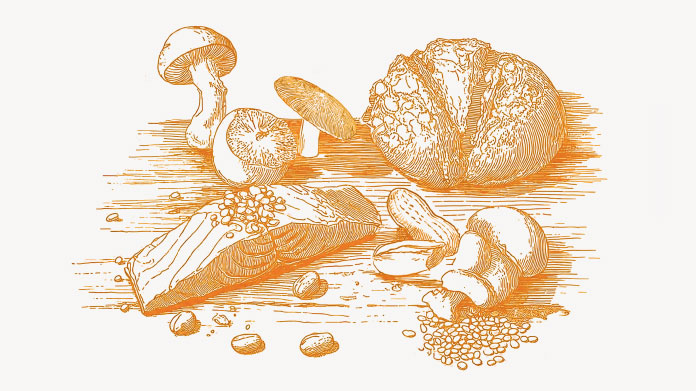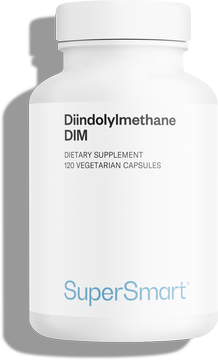Multivitamins: what are the benefits? How do you make the best choice?
Do you feel somewhat overwhelmed by the choice of multivitamin supplements on offer? Do you find it impossible to choose between all the various formulations available? Read on for our key tips on how to make an informed choice when it comes to multivitamins.

What exactly is a multivitamin?
In the literal sense, a multivitamin is a dietary supplement that contains several vitamins. In reality, it is more often one that contains a combination of vitamins, minerals and phytonutrients beneficial for human health.
Multivitamin supplements generally provide between half and double the recommended daily amount (RDA) of a given nutrient. They come in various forms (tablets, capsules, pastilles, powders …) and are taken once or several times a day depending on the composition.
What benefits are offered by a multivitamin?
As we know, vitamins and minerals play a key role in many essential physiological functions. For example:
- vitamin B1 supports normal energy metabolism and nervous system function and helps maintain mental stability (1);
- vitamin D, in which deficiency remains common, supports healthy bones and immune system function (2) ;
- zinc, found primarily in seafood and offal, supports healthy hair and nails, and also plays a role in normal DNA and protein synthesis (3).
A multivitamin supplement is therefore a welcome source of additional nutrients providing daily support for your health. In no circumstances, however, should it be seen as a substitute for a balanced diet and healthy lifestyle: just because you’re dutifully taking a course of multivitamins doesn’t mean you can eat fast food every day!
What’s more, specific population groups may benefit in particular from supplementing with vitamins and minerals as they are more likely to develop deficiencies: vegans who exclude animal-source products from their diet, the elderly who tend to have smaller appetites, those under intense stress, top athletes… (4-7)
Does the science support multivitamin supplementation? Led by Harvard University in 2012, the large-scale Physicians' Health Study II looked at the effects of taking multivitamin supplements among a sample of 14,641 subjects over several years. Significant results were observed at a cellular level (8).
How do you choose the right multivitamin supplement?
Adequate vitamin and mineral doses
A, B, C, D, E, K, Mo, Zn… in understanding this new ‘multivitamin alphabet’, the first thing to say is that a good supplement should offer doses close to recommended daily amounts … without ever exceeding upper safe levels. In the case of strong>iodine for example, 150 µg/day is deemed to be a sufficient intake according to the EFSA (European Food Safety Authority), but you should not exceed 600 µg/day.
It’s worth noting that with certain water-soluble vitamins such as vitamin C, there is a greater degree of flexibility. As any excess vitamin is eliminated via urine, the risk of overdosing is minimal.
How about minerals? According to a study conducted between 2001 and 2002, the magnesium intake of 48% of the US population was below the RDA. Yet this mineral plays a crucial role in supporting normal muscle and nervous system function (9). So a multivitamin is all the better for including it in its formulation (though not above a level of 250mg/day in the form of dissociable magnesium or magnesium oxide).
With regard to trace elements, zinc, selenium, iodine and molybdenum all play a role in numerous enzyme and/or hormone reactions. It therefore makes sense to boost your daily intake of them through supplementation.
Substances to avoid
Conversely, there are some substances that should be viewed with caution, including iron and copper. In individuals who already have adequate amounts, supplementing with these minerals could raise levels to the point where they exert an adverse prooxidant effect on cells (10-11).
Beware too of controversial synthetic excipients! Magnesium stearate and silicon dioxide contain nanoparticles, thought to pose a risk to health.
Another important factor: bioavailability of ingredients
While it’s important to scrutinise the list of substances in a multivitamin supplement, it’s also vital that these substances are bioavailable! To offer genuine health benefits, multivitamins need to contain the forms of vitamins and minerals absorbed most effectively by the body. For example, according to the latest studies, pyridoxal-5-phosphate is the most bioactive form of vitamin B6 (12).
For optimal absorption, it is also appropriate to prioritise natural sources which are more suited to human physiology - like d-alpha tocopherol for vitamin E or selenomethionine for selenium.
Opt too for reputable phytonutrients
Is it just vitamins and minerals in these supplements? Drawing on the most up to date scientific data, certain formulations have chosen to include phytonutrients and other active compounds to produce comprehensive synergistic effects.
Amongst others, you’ll find certain carotenoids (such as lutein and lycopene), quercetin, apigenin, and the famous pyrroloquinoline quinone (PQQ) – which is currently the subject of several promising studies into its effects on mitochondria (13). There’s no doubt that a whole new era is opening up in the world of multivitamins!
Last but not least, choose a supplement with a dosage that’s right for you
If you’re planning to start taking a multivitamin, the supplement Daily 3 combines no less than 42 ingredients selected for their high bioavailability– including 12 vitamins, 8 minerals, and carefully-selected phytonutrients (lutein, anthocyanins, luteolin, apigenin …) with a recommended dose of 2 to 3 vegetarian capsules a day.
If you’re particularly busy or preoccupied, it may be better to opt for a supplement that only needs to be taken once a day (such as Daily 1, which combines 30 active substances in a one-a-day tablet).
References
- Wiley KD, Gupta M. Vitamin B1 Thiamine Deficiency. [Updated 2020 Jun 22]. In: StatPearls [Internet]. Treasure Island (FL): StatPearls Publishing; 2021 Jan-. Available from: https://www.ncbi.nlm.nih.gov/books/NBK537204/
- Roth DE, Abrams SA, Aloia J, et al. Global prevalence and disease burden of vitamin D deficiency: a roadmap for action in low- and middle-income countries. Ann N Y Acad Sci. 2018;1430(1):44-79. doi:10.1111/nyas.13968
- Roohani N, Hurrell R, Kelishadi R, Schulin R. Zinc and its importance for human health: An integrative review. J Res Med Sci. 2013;18(2):144-157.
- Sakkas H, Bozidis P, Touzios C, et al. Nutritional Status and the Influence of the Vegan Diet on the Gut Microbiota and Human Health. Medicina (Kaunas). 2020;56(2):88. Published 2020 Feb 22. doi:10.3390/medicina56020088
- Thomas DR. Vitamins in aging, health, and longevity. Clin Interv Aging. 2006;1(1):81-91. doi:10.2147/ciia.2006.1.1.81
- Pickering G, Mazur A, Trousselard M, et al. Magnesium Status and Stress: The Vicious Circle Concept Revisited. Nutrients. 2020;12(12):3672. Published 2020 Nov 28. doi:10.3390/nu12123672
- Constantini NW, Arieli R, Chodick G, Dubnov-Raz G. High prevalence of vitamin D insufficiency in athletes and dancers. Clin J Sport Med. 2010 Sep;20(5):368-71. doi: 10.1097/JSM.0b013e3181f207f2. PMID: 20818195.
- Christen WG, Gaziano JM, Hennekens CH. Design of Physicians' Health Study II--a randomized trial of beta-carotene, vitamins E and C, and multivitamins, in prevention of cancer, cardiovascular disease, and eye disease, and review of results of completed trials. Ann Epidemiol. 2000 Feb;10(2):125-34. doi: 10.1016/s1047-2797(99)00042-3. PMID: 10691066.
- Schwalfenberg GK, Genuis SJ. The Importance of Magnesium in Clinical Healthcare. Scientifica (Cairo). 2017;2017:4179326. doi:10.1155/2017/4179326
- Fisher AE, Naughton DP. Iron supplements: the quick fix with long-term consequences. Nutr J. 2004;3:2. Published 2004 Jan 16. doi:10.1186/1475-2891-3-2
- Araya M, Olivares M, Pizarro F, Méndez MA, González M, Uauy R. Supplementing copper at the upper level of the adult dietary recommended intake induces detectable but transient changes in healthy adults. J Nutr. 2005 Oct;135(10):2367-71. doi: 10.1093/jn/135.10.2367. PMID: 16177197.
- Allen GF, Neergheen V, Oppenheim M, Fitzgerald JC, Footitt E, Hyland K, Clayton PT, Land JM, Heales SJ. Pyridoxal 5'-phosphate deficiency causes a loss of aromatic L-amino acid decarboxylase in patients and human neuroblastoma cells, implications for aromatic L-amino acid decarboxylase and vitamin B(6) deficiency states. J Neurochem. 2010 Jul;114(1):87-96. doi: 10.1111/j.1471-4159.2010.06742.x. Epub 2010 Apr 9. PMID: 20403077.
- Hwang PS, Machek SB, Cardaci TD, Wilburn DT, Kim CS, Suezaki ES, Willoughby DS. Effects of Pyrroloquinoline Quinone (PQQ) Supplementation on Aerobic Exercise Performance and Indices of Mitochondrial Biogenesis in Untrained Men. J Am Coll Nutr. 2020 Aug;39(6):547-556. doi: 10.1080/07315724.2019.1705203. Epub 2019 Dec 20. PMID: 31860387.
Keywords
59 Minutes
Good quality product and customer service.
So far, I'm liking this product, and the customer service was very good.
ELZL
6 Days
The products I use are excel·lent
The products I use are excel·lent
ROSAS Josep Maria
14 Days
Delivery is prompt and I never saw a…
Delivery is prompt and I never saw a quality problem with the manufacturing. It is not possible to assess efficacy on a personal basis, since too many factors come into play. Efficacy can only be assessed statistically with a sufficient number of cases.
Roger De Backer
15 Days
I collaborates with the Supersmart…
I collaborates with the Supersmart more than 10 years. Every thing is going good. Quality of the things is good. Delivery comes in time. Five stars definitely !!!
Oleksiy
16 Days
All good
Simple, frictionless site, easy ordering, good delivery updates and execution.
Chris Robbins
18 Days
I feel better
I feel better
Peter Ammann
18 Days
Prompt delivery
Prompt delivery
JAKUB Radisch
19 Days
My new go-to for top quality supplements!
I am buying more and more of my supplements from this superb, high quality company. Cannot recommend it enough. Plus, excellent customer service with a quick, helpful team and speedy deliveries. Highly recommend Supersmart!
Cecilie H.
23 Days
SUPERSMART WHAT ELSE👍
SUPERSMART WHAT ELSE👍
DIEDERLE Christophe
26 Days
Excellent quality products with…
Excellent quality products with innovative formulas, as someone who has been suffering with acid reflux, these supplements have been lifesavers.
Oriana Moniz
26 Days
high quality supplement!
high quality supplement!
GALANT
26 Days
Good service prompt delivery
Good service prompt delivery
Mrs Marcella Reeves
31 Days
I like your clear explanation
I like your clear explanation. And how to make a choice of products for a specific health problem
Ingrid
38 Days
Great product and it arrives quickly.
Great product and it arrives quickly.
SOMMARIVA Gianni
39 Days
Excellent products and fast service.
Excellent products and fast service. What do we need more?
Margarida





